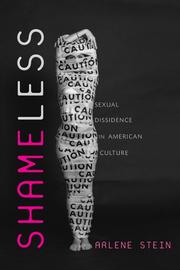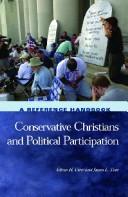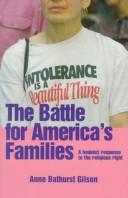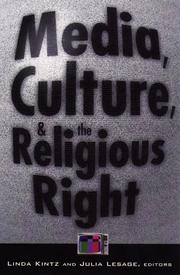| Listing 1 - 10 of 60 | << page >> |
Sort by
|
Book
ISBN: 1412353270 Year: 2006 Publisher: Chicoutimi : J.-M. Tremblay,
Abstract | Keywords | Export | Availability | Bookmark
 Loading...
Loading...Choose an application
- Reference Manager
- EndNote
- RefWorks (Direct export to RefWorks)

ISBN: 0814740278 0814740286 9780814740279 9780814740286 Year: 2006 Publisher: New York : New York University Press,
Abstract | Keywords | Export | Availability | Bookmark
 Loading...
Loading...Choose an application
- Reference Manager
- EndNote
- RefWorks (Direct export to RefWorks)
View the Table of Contents . Read the Introduction A sophisticated and subtle collection of essays. . . . Stein's innovative volume stands out. . . . Stein's book is notable for combining a commitment to qualitative social science methods with an appropriate grasp of its limitations. She is unusually clear-eyed about the shifting politics of knowledge . . . and reminds us that both sides in the culture wars depend on those we entrust to produce knowledge. -'Gay and Lesbian Review Worldwide'"Arlene Stein has established herself as one of the premier sociologists of sexuality writing today. Skillfully combining historical, sociological, and cultural approaches, this book offers powerful accounts of sexuality in America." -Steven Seidman, author of 'Beyond the Closet: The Transformation of Gay and Lesbian Life'" Shameless is a lively and clear-headed account of the Two Americas--sexual liberals and the conservatives who have opposed them--and how America came to be the land of sex and shame." -Alice Echols, author of 'Shaky Ground: The Sixties and Its Aftershocks'"Arlene Stein is among the most original, wise, bold, and engaging sociological analysts of U.S. culture wars in print today. This riveting collection, displaying capacious intellect and graceful prose, is a must-read for anyone concerned with contemporary clashes over sex, gender, and culture." -Judith Stacey, author of 'In the Name of the Family: Rethinking Family Values in the Postmodern Age'Shame, a powerful emotion, leads individuals to feel vulnerable, victimized, rejected. In Shameless, noted scholar and writer Arlene Stein explores American culture's attitudes toward shame and sexuality.Some say that we live in a world without shame. But American culture is a curious mix of the shameless and the shamers, a seemingly endless parade of Pamela Andersons and Jerry Falwells strutting their stuff and wagging their fingers. With thoughtful analysis and wit, Shameless analyzes these clashing visions of se
Lesbianism --- Modernist-fundamentalist controversy. --- Religious right
Book
ISBN: 1108284892 1108286690 1108287050 1108287778 1108289215 1108278175 1108288138 1108417701 1108405606 Year: 2017 Publisher: Cambridge : Cambridge University Press,
Abstract | Keywords | Export | Availability | Bookmark
 Loading...
Loading...Choose an application
- Reference Manager
- EndNote
- RefWorks (Direct export to RefWorks)
The Rights Turn in Conservative Christian Politics documents a recent, fundamental change in American politics with the waning of Christian America. Rather than conservatives emphasizing morality and liberals emphasizing rights, both sides now wield rights arguments as potent weapons to win political and legal battles and build grassroots support. Lewis documents this change on the right, focusing primarily on evangelical politics. Using extensive historical and survey data that compares evangelical advocacy and evangelical public opinion, Lewis explains how the prototypical culture war issue - abortion - motivated the conservative rights turn over the past half century, serving as a springboard for rights learning and increased conservative advocacy in other arenas. Challenging the way we think about the culture wars, Lewis documents how rights claims are used to thwart liberal rights claims, as well as to provide protection for evangelicals, whose cultural positions are increasingly in the minority; they have also allowed evangelical elites to justify controversial advocacy positions to their base and to engage more easily in broad rights claiming in new or expanded political arenas, from health care to capital punishment.
Christian conservatism --- Religious right --- Abortion --- Religious aspects --- Christianity. --- Political aspects

ISBN: 1851095136 1851095187 Year: 2004 Publisher: Santa Barbara, Calif. : ABC-CLIO,
Abstract | Keywords | Export | Availability | Bookmark
 Loading...
Loading...Choose an application
- Reference Manager
- EndNote
- RefWorks (Direct export to RefWorks)
Religious right --- Christianity and politics --- Droite religieuse --- Christianisme et politique
Book
ISBN: 1283233797 9786613233790 1442211075 9781442211070 1442211067 9781442211063 9781442211056 1442211059 9781283233798 661323379X Year: 2011 Publisher: Lanham Rowman & Littlefield Pub. Group
Abstract | Keywords | Export | Availability | Bookmark
 Loading...
Loading...Choose an application
- Reference Manager
- EndNote
- RefWorks (Direct export to RefWorks)
While the Religious Right has received considerable scholarly attention and media coverage in recent years, the story of the growing number of Secular Americans-those who identify themselves as atheists, agnostics, or as not having any religious ties-has yet to be told. In the first book devoted exclusively to Seculars, Susan B. Hansen argues that they are not only increasing in number and political involvement, but have devised strategies and alliances to counter the organization advantages of the Religious Right and its roots in church-based groups and the Republican party.
Religious right --- Christianity and politics --- United States --- Church history

ISBN: 0829813446 Year: 1999 Publisher: Cleveland Pilgrim Press
Abstract | Keywords | Export | Availability | Bookmark
 Loading...
Loading...Choose an application
- Reference Manager
- EndNote
- RefWorks (Direct export to RefWorks)
Whats behind the claims of the Christian right regarding families? Anne Gilson argues that the Christian Right uses a theology based on an ideology of control manifested in two ways: Sexual politics where families should have well-defined gender roles for heterosexual parents that exclude lesbians and gay men, and economic politics where welfare should not support women who bear children but will not serve under the headship of a husband and refuse to work. Her response to this theology is based not on judgment and repression but on justice and the concept of Christians as moral agents. (Pilgrim Press)
Families --- Feminist ethics --- Feminist theology --- Religious right --- Religious aspects --- Christianity
Book
ISBN: 9780334059233 0334059232 Year: 2020 Publisher: London SCM Press
Abstract | Keywords | Export | Availability | Bookmark
 Loading...
Loading...Choose an application
- Reference Manager
- EndNote
- RefWorks (Direct export to RefWorks)
Christianity and politics --- Christians --- Religious right --- Religious right --- Religious right --- Islam --- Christianity and other religions --- Radicalism --- Religious fanaticism --- Religious fundamentalism --- Terrorism --- 322 --- Political activity --- History --- History --- History --- Relations --- Christianity --- Islam --- Godsdienstige tolerantie. Godsdienstpolitiek

ISBN: 0816630852 Year: 1998 Publisher: Minneapolis London University of Minnesota Press
Abstract | Keywords | Export | Availability | Bookmark
 Loading...
Loading...Choose an application
- Reference Manager
- EndNote
- RefWorks (Direct export to RefWorks)
Christianity and culture --- Mass media --- Religious right --- Religious aspects --- Christianity. --- Evangelicalism --- United States --- Conservatism --- Christianity
Book
ISBN: 1280814799 Year: 1998 Publisher: Oxford : Oxford University Press,
Abstract | Keywords | Export | Availability | Bookmark
 Loading...
Loading...Choose an application
- Reference Manager
- EndNote
- RefWorks (Direct export to RefWorks)
This study examines the place and nature of religion in industrial societies through a comparative analysis of conservative Protestant politics in a variety of societies.
Christianity and politics --- Christian conservatism --- Christianity --- Religion --- Philosophy & Religion --- Protestant churches --- Conservatism --- Religious right
Book
ISBN: 0190269243 019026926X 0190269278 0190269251 9780190269258 9780190269241 Year: 2016 Publisher: New York, NY
Abstract | Keywords | Export | Availability | Bookmark
 Loading...
Loading...Choose an application
- Reference Manager
- EndNote
- RefWorks (Direct export to RefWorks)
The United States was not founded as a Christian nation, since slavery was in the Constitution but Jesus was not. The Covenanters, America's first Christian nationalists and earliest abolitionists, advanced that argument to the Founding Fathers and to generations of Americans. From their brief reign over Scotland to their failed attempts to amend the American Constitution to acknowledge Christ, Covenanters infused themselves into the long tradition of Christian nationalism that forged the modern religious Right. This book examines the forgotten history of America's first Christian nationalists.
Religious right --- Church and state --- Covenanters --- History. --- Conservatism --- Right and left (Political science)
| Listing 1 - 10 of 60 | << page >> |
Sort by
|

 Search
Search Feedback
Feedback About UniCat
About UniCat  Help
Help News
News